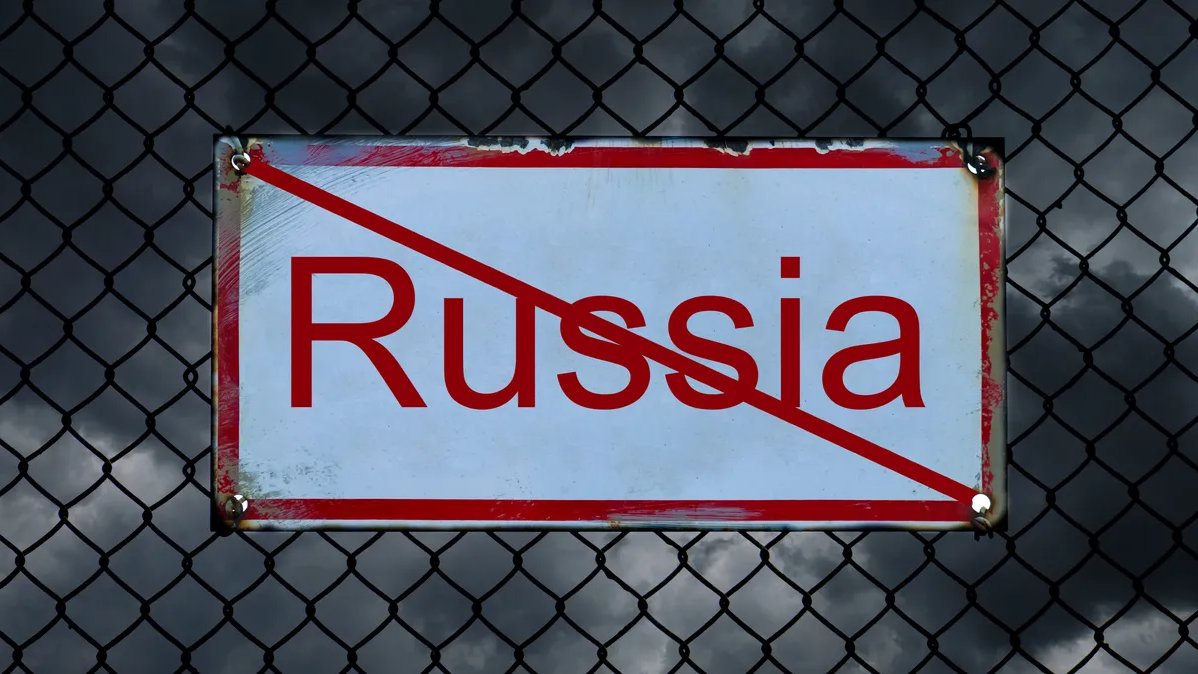After 24 February, hundreds of foreign companies declared their solidarity with Ukraine and announced their withdrawal from Russia. In reality, however, there are few that have completely withdrawn their businesses from the country. Novaya Gazeta. Europe studied the reports of more than 60 major foreign investors in the Russian economy, and talked to sources and experts who are helping foreign businesses withdraw from Russia. Using examples from key players in a number of critical industries, we report on the five exit strategies chosen by foreign firms.
Yale University’s Chief Executive Leadership Institute (CELI) compiled a list of statements made by foreign firms who used to work in Russia before 24 February. As of the end of August, the Yale CELI list numbers 1,385 companies grouped into five categories according to their involvement in the Russian economy, ranging from those who have withdrawn completely to those who are “buying time” or “scaling back.”
The problem with this list is that it relies on corporate statements without taking the real state of affairs into account. That is why, for example, Danish brewing giant Carlsberg is listed as having “exited Russia completely”, although there have been no reports so far of its Russian brewing subsidiary, Baltika, changing ownership.
Nevertheless, according to the Yale CELI list, only about a fifth of the companies have left the market completely, while another third have frozen their operations, and almost 600 firms have merely scaled back their business, “bought time” or simply done nothing.
We analysed the reports of over 60 major foreign investors in the Russian economy and found out that many have failed to find a buyer for their assets, while others, having loudly slammed the door with the onset of the war, have kept their options open. Others have simply decided to wait it out. There are also those who have openly admitted to keeping their businesses in Russia, with no plans to leave. Novaya Gazeta. Europe took a look at foreign firms’ five main exit strategies after 24 February.
Five ‘exit’ strategies from the Russian market
Among the 60 cases we studied, only eight companies suffered losses in the first half of 2022 (not necessarily related to Russia). The German energy company Uniper (€12.4 billion due to higher prices for Russian gas on the German market), BP ($11.1 billion) and Renault (€1.7 billion) took the biggest bit, with the latter two attributing their losses to withdrawing from the Russian market.
Almost all the companies surveyed have recorded non-cash write-offs from their business in Russia, which were far from always responsible for their losses.
These costs are often of a non-monetary nature, meaning they do not necessarily affect profits and losses; in other cases, they are fully covered by company profits. For the 31 large companies that showed such write-offs (not all disclose these figures, such as Korean and Chinese firms), the losses amounted to $55bn.
Interestingly, a significant share of firms — retailers, tobacco producers and oil and gas companies — were able to generate and even increase their revenues in Russia. Others have incurred no costs in what has suddenly become a toxic market — Phillip Morris, for instance, which generates 6% of its global revenue in the country. For retailers, consumer goods manufacturers and energy companies, Russia generally brings in more than 10% and even more than 20% of their annual revenue. For firms in other segments, the figure is usually more modest, coming in at less than 10%.
Leaving for good
As Novaya Gazeta. Europe’s research has revealed, many companies either cannot leave Russia, or are trying their best to return to pre-war times. Market operators and experts both claim that “clean” exits from the Russian market are few and far between. There are just a handful of cases where a foreign firm was able or wanted to get round all the hurdles and sell or transfer the assets to a Russian partner in such a way that they left for good.
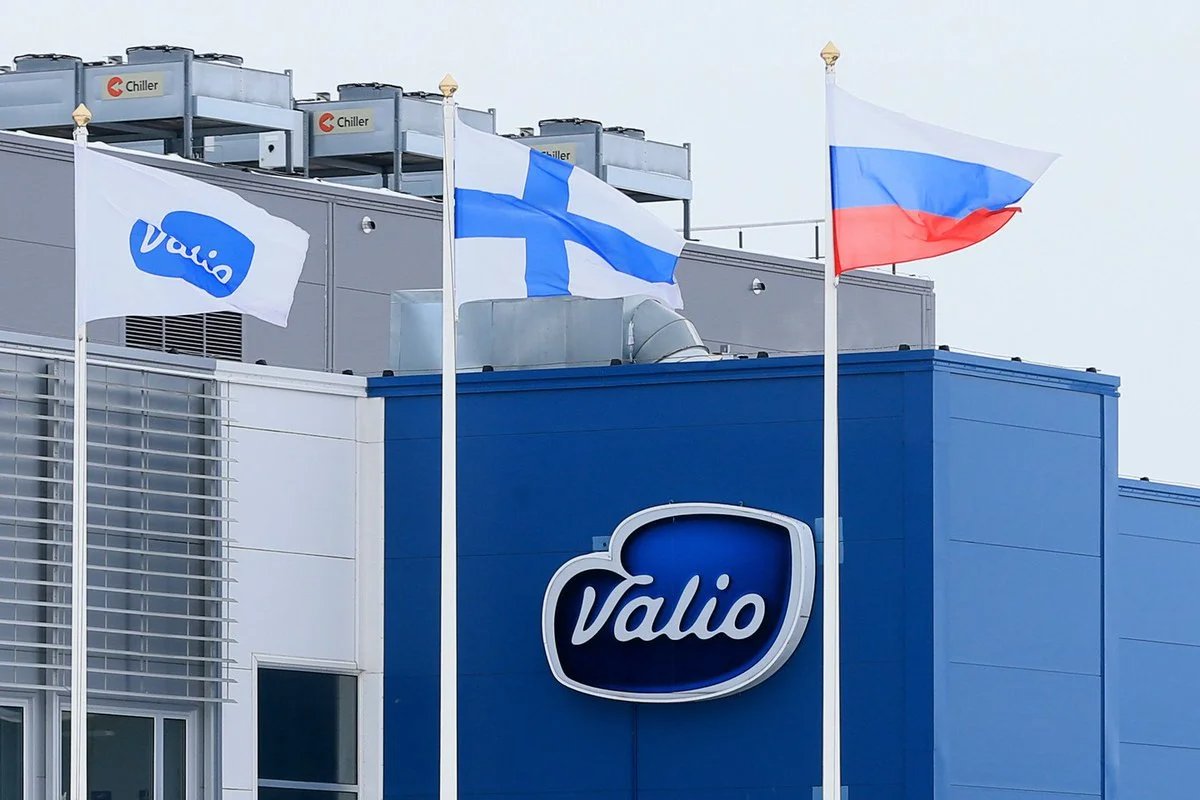
Photo: valio.ru
One of them is the Finnish firm Valio, which was among the first to sell its cheese plant near Moscow to Russian sausage producer Velcom back in April, together with its popular Viola brand. The plant and equipment are an easily alienated asset, says Ivan Fedyakov, founder and CEO of the INFOLine analytics agency. “It’s not clear as to what Valio plans on doing with the money from the sale. Russian law prohibits withdrawing it out of the country, and foreign financial institutions — even banks in Kazakhstan — refuse to accept money from Russian banks,” he notes.
However, companies with assets around the world can overcome the ban on capital exports by exchanging assets in Russia for facilities in other countries, Fedyakov said. In his opinion, this could be the strategy for Polish clothing retailer LPP (owner of the Reserved, Cropp, House, Mohito and Sinsay brands), which sold its Russian division to a Chinese consortium this spring. In any case, a buyer can only be a company from a so-called “friendly” country. The sale of Whirlpool’s home appliance factories to Turkey’s Arcelik is one example of such a deal.

Photo: Maksim Konstantinov / SOPA Images / Getty Images
A rare example of a “clean” exit in the oil and gas sector is the sale of part of Shell’s assets. The Dutch-based energy multinational transferred 411 petrol stations and a motor oil plant in the town of Torzhok to Russia’s Lukoil, while competitor Gazprom Neft received Shell’s 50% stake in the Gydan Energy oil field. Shell was one of the largest Western investors in Russia and actively financed the development of hard-to-recover oil production technologies that Russia did not have.
As a result, the corporation was one of the most affected by the war — it had to fix an asset impairment charge of almost $3.8bn, including admitting that a $1.1bn loan to build the Nord Stream 2 pipeline would not be repaid. Shell was also unable to get rid of its biggest asset in Russia — its stake in the Sakhalin LNG plant (more on this further on in the text).
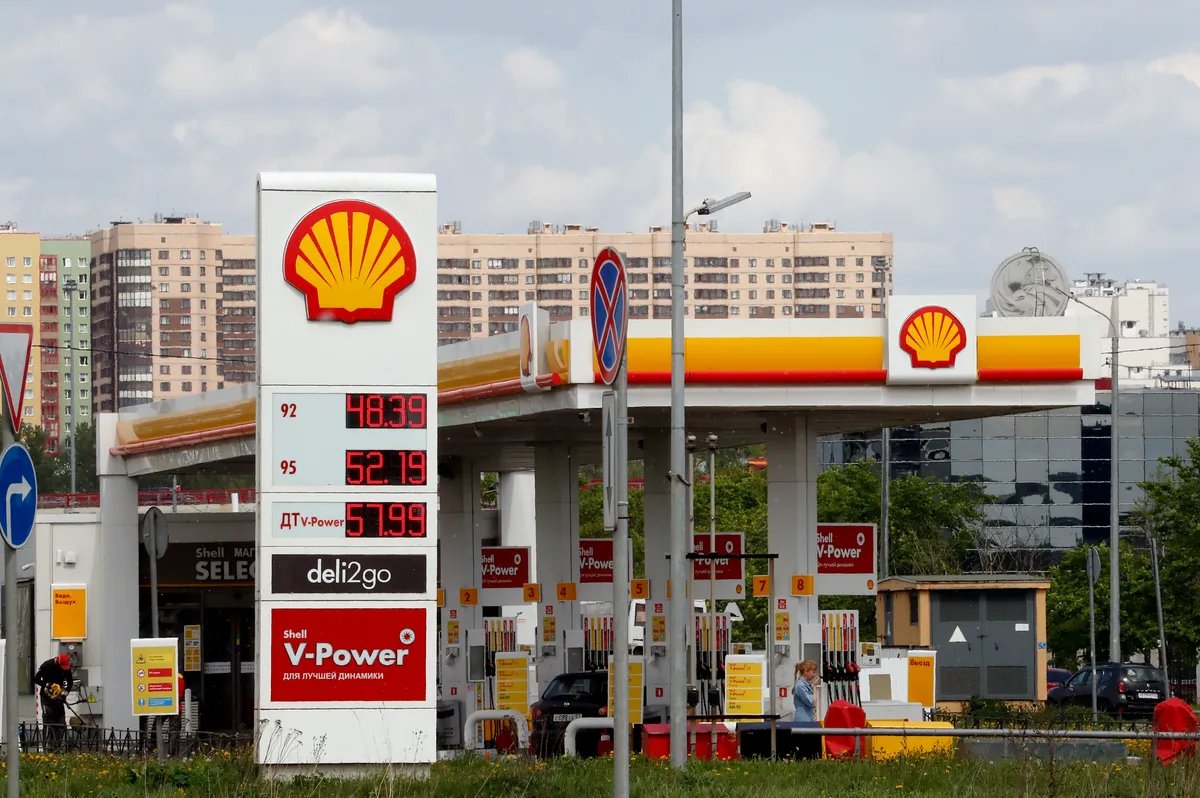
Photo: EPA-EFE / ANATOLY MALTSEV
There are two more examples of a “clean break” in Russia’s banking sector. Global financial institutions are trapped: on the one hand, they are banned from operating in the Russian market by international sanctions, and on the other, Russian authorities prevent them from leaving. In July, Russia’s Ministry of Finance announced that it would not approve the sale of banks. Prior to the decision, two financial institutions were able to get rid of Russian assets: French bank Societe Generale managed to close the sale of Rosbank to Vladimir Potanin’s Interros. Notably, Potantin formerly owned Rosbank, merely buying back his assets from the French financial conglomerate. In doing so, SocGen was also among the hardest hit by the exit, losing €3.2bn in the process. Russia’s Home Credit Bank has also been disposed of by the Czech PPF Group.
Unlike SocGen and PPF, HSBC, Europe’s largest banking group, did not manage to get rid of its business in time. In July, it reached an agreement with Russia’s Expobank, setting up the sale of its assets, which was cut short by Vladimir Putin’s August decree banning the sale of banks.
Putin’s decree means that Italian banking group Unicredit is also unlikely to find a buyer for its Russian business, having initially offered it to investors from China and India. In the words of Russian Deputy Finance Minister Alexey Moiseyev, foreign banks appear to “have nothing to look forward to.”
Leaving with a return ticket
This is a fairly common strategy — one favoured by companies that want to distance themselves from the toxic Russian market but want to avoid burning bridges, leaving the door open for a potential return. French multinational Renault was one of the biggest names to do so, getting rid of its Moscow plant for a symbolic 1 ruble and 67.69% of Russian automaker AvtoVAZ, while keeping the option to return by agreeing to a buy-back option within six years.
It seems that the French, like many others, are not losing faith that Russia’s current war on the world cannot go on forever. “Companies want to leave with the opportunity to come back. They want to leave without leaving,” confirms a source who advised French and Italian consumer goods firms leaving Russia.
It is possible that British American Tobacco (BAT) and Imperial Brands, the major cigarette producers in Russia, could have chosen the same strategy, says an unnamed source in the tobacco market. BAT has handed over its assets to its distributor SNC, while Imperial Brands sold it to a group of Russian entrepreneurs in the cigarette and food industries. According to the source, the structure of the deals could include options for both multinationals resuming their operations in Russia.
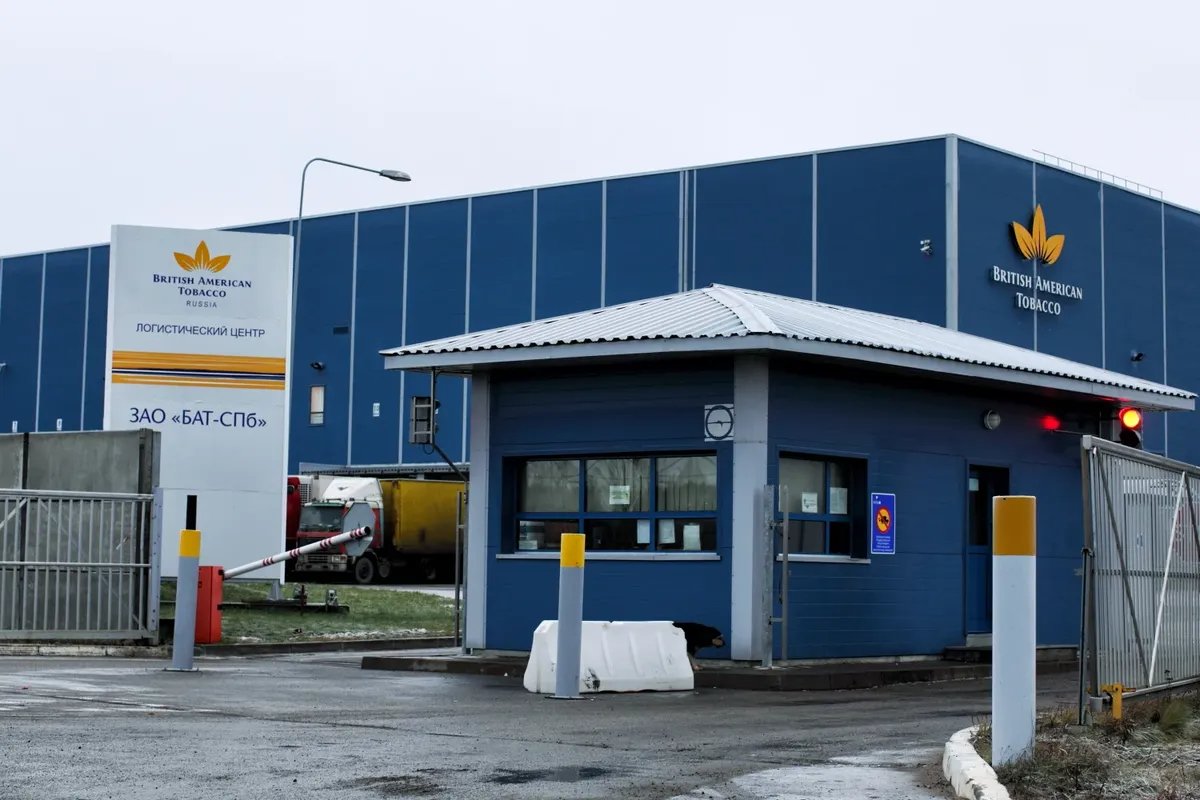
Photo: batrussia.ru
A consultant who helped two companies in the consumer sector leave Russia said that his French client had been given the option to return, while another of his clients, an Italian firm, had agreed that it could subsequently resume operations in Russia if the EU authorities ever agreed to it. “The parent companies in Paris and Milan were in no mood to lose the Russian market, but they were pushed to withdraw by reputational and sanctions risks. On top of that, the Italian company was almost 100% dependent on halted imports, while the French one third too.”
The firms were mainly based in Moscow, and the local authorities initially imposed the same conditions for companies changing hands — save the business, retain all employees along with the tax base. The new Russian owners agreed to meet them, and the Moscow government agreed to the departure of the Europeans, even helping the businesses reach agreements with new Russian suppliers.
“The French had no problem selling the business to a Russian senior executive, while the Italians found it more difficult to find a buyer who would agree to work with the Moscow authorities in the future. In the end, their retail outlets were bought out by a competitor from a ‘friendly’ country,” the consultant recalls. The deals were closed in May and June, and the Europeans withdrew the money through Kazakhstan-based banks. “This is common practice and is not particularly difficult,” says the source.
Staying behind, but not by choice
Many large companies, from global retailers to oil and gas giants and industrial firms, are in a stalemate. They want to leave Russia and are doing their best to withdraw, but legal, organisational and financial obstacles prevent them from doing so.
Large foreign retailers who have invested tens of millions of dollars in the development of Russian retail continue to operate, while supermarket chains, such as French multinational Auchan and Germany-based Metro AG, for example, cannot sell their businesses to Russian operators.
In the case of Metro and Auchan, a potential sale to Russian competitors Magnit, Dixy or X5 would give them a market share of over 25% in Russia’s regions, which is forbidden by anti-monopoly law. Other chains, such as French DIY store Leroy Merlin, simply cannot find a buyer for its very expensive assets — each store costs about 1 billion rubles (close to €16m), according to INFOLine’s Fedyakov.
The situation with Swedish furniture chain IKEA, whose stores in Russia were shut in early March, is even more difficult — the price of its stores is only part of the problem. According to Fedyakov, it is “almost impossible” to sell atypical stores built specifically for the company’s format. Clothing retailer H&M, which has also failed to find a buyer, also operates non-standard outlets, but it is still possible to “cut them up” to match a simpler format, which is impossible to do with IKEA, Fedyakov said. H&M reopened its Russian stores in August after a five-month shutdown to sell off its remaining products.
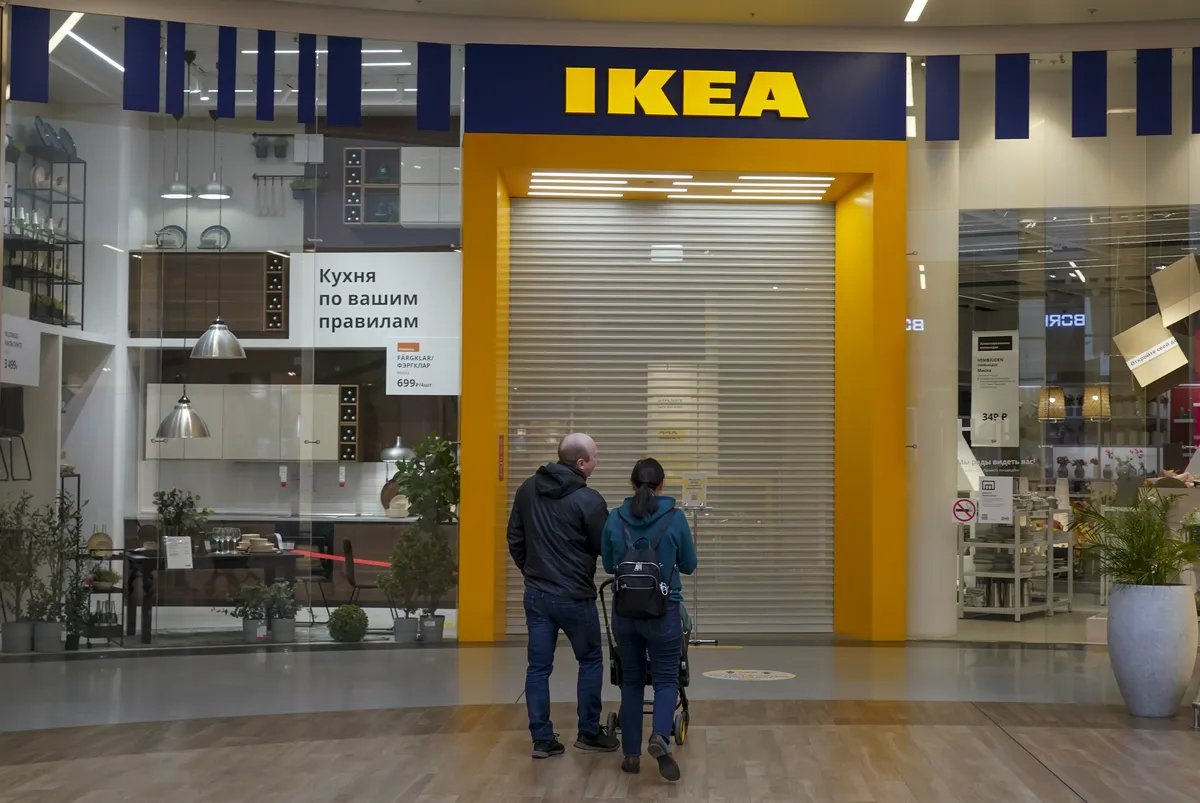
Photo: Pavel Pavlov / Getty Images
The appeal of IKEA’s assets is further dampened by the fact that furniture sales in Russia have fallen by 30-35% this year. “Therefore, these assets are unattractive, you would rather have to pay extra for them in order for someone to commit to paying salaries and other mandatory payments,” Fedyakov notes.
For all these reasons, he says, “those who managed to leave are more likely to be exceptions — these deals aren’t fully understood and, most likely, aren’t yet complete.” Fedyakov’s scepticism arises from the fact that it is possible to get rid of one’s Russian assets, but very difficult to get money out of the country. Only those who had fairly standard and simple stores, such as the already mentioned LPP, managed to sell their Russian businesses.
Not only the biggest retailers have been trapped — industrial giants have also taken a hit. Dutch oil and gas corporation Shell appears to have suffered the most, as it was initially slow in searching for a buyer for its 27.5% stake in its biggest investment project, the Sakhalin-2 LNG plant.
Four months of negotiations ensued until, on 30 June, Vladimir Putin issued a decree transferring the assets of the plant to a specially created Russian company, and Shell was said to be either “obliged” to become its shareholder or lose its stake in the plant, which would be forcibly sold to a “Russian legal entity.”
The Russian government will then determine whether Shell has caused environmental, technological and financial damage, and will issue a fine if it finds the company guilty. Putin’s decree already claims that the activities of “certain foreign legal entities” on the island of Sakhalin have led to “the threat of a natural or technogenic emergency.”
At the beginning of September, Shell announced to the Russian government that it does not want any shares in the new company to replace the old one — this is contrary to its strategy of withdrawal from Russia, and that it reserves all its rights to a stake in the Sakhalin-2 plant. What this means, in effect, is that Shell will sue the Kremlin if it takes the asset away, effectively seizing it under the guise of a fine.
However, Novaya Gazeta. Europe’s sources have conceded that the big investors were in no hurry to do deals, hoping to wait out the tough times — it is now clear that their hopes were in vain.
Leaving, but not just yet
International industrial giants that have invested billions of dollars in huge production facilities over the last 15-20 years are showing understandable sluggishness in withdrawing from the Russian market.
These include some of the world’s largest global tobacco companies, such as Japan Tobacco Inc (JTI), which owns four factories in Russia, and Phillip Morris (PMI), which counts $2.5 billion worth of assets and two factories in the country, with the market accounting for 6% of its global sales. Russia is a strategic market for both multinationals — one that brings in huge profits.
So far it is limited to the fact that immediately after the outbreak of the war both companies have made rather streamlined statements. JTI says it “continues to weigh various possibilities regarding business in Russia, including the potential transfer of ownership.”
PMI talks about exiting the market without mentioning the sale of assets. In a recent Bloomberg interview, PMI head Jacek Olchak said he intends to leave Russia by the end of the year — without explaining how. Both multinationals’ press offices declined to comment on the details, redirecting a Novaya Gazeta. Europe reporter to the latest corporate statements.
A source in the tobacco market explains: the main difficulty is that both JTI and PMI have the same distributor in Russia — the retail giant Megapolis. “If Megapolis buys PMI’s assets, JTI won’t be able to sell its business to them as they won’t be able to work with the owners of their direct competitors, and vice versa. BAT’s [British American Tobacco’s] case was much easier as it had one exclusive distributor that only worked with BAT. It’s important to remember that at JTI, rationality and composure always come before emotion — they’ll measure twice and cut once,” he explains. Another source assumes that Russian companies working with PMI and JTI are looking to structure a possible deal so that the assets of two major global competitors don’t end up in the same hands.
Beer giants Carlsberg and Heineken are two other corporations that promised to transfer their business to other owners immediately after the war began. Along with AB InBev-Efes, the three corporations control the majority of the Russian beer market. Promises were made, but not kept.
A source familiar with the situation believes that no one in Russia will buy these assets due to their high value. The likelihood that a buyer will come from a “friendly” country is low for the same reason, he believes. “This is why nothing has changed for the Russian breweries so far — the business is taking care of itself. There aren’t any layoffs or panic, there are no signs of a pending transaction either, no one is doing due diligence and so on. Foreign shareholders, I think, aren’t forcing the situation either and aren’t inviting potential buyers to negotiate,” says the source.
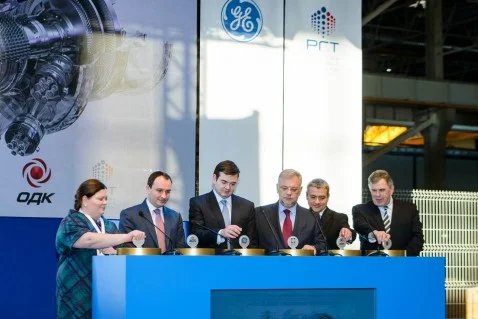
Opening of a plant for the production, sale and maintenance of gas turbines in Rybinsk. Photo: GE.com
American industrial giant General Electric has followed a similar strategy. In March, it announced a freeze on its Russian operations — meanwhile, its joint Russian Gas Turbines plant with Inter RAO in Rybinsk, is operating as usual. GE has retained its stake in the facility, and there are no signs of any sales talks. However, after Putin’s decree banning “unfriendly” shareholders from selling stakes in “strategic” firms and the energy sector as a whole, such a deal is impossible.
Multiple sources interviewed by Novaya Gazeta. Europe have pointed to the legal difficulties of leaving Russia, but experts have dismissed these complaints as disingenuous. “I think there are no insurmountable legal obstacles to [such an] exit, and the fact that the process is stretched out can be explained by the fact that companies simply don’t want to lose their business and are looking for the highest bidder,” explains Egor Noskov, managing partner of law firm Duvernoix Legal.
No promises
This is the strategy chosen by European energy companies — which seems absurd, given the EU’s intention to phase out Russian oil and gas. Western energy firms have offered a simple explanation: it is currently impossible to sell their Russian assets but it is important to keep them in order to continue supplying gas to Europe.
This is the official version of French multinational TotalEnergies — a major shareholder in Russia’s second-largest gas producer Novatek and its giant LNG plants in the Yamal peninsula. TotalEnergies parted with assets that sell fuel inside Russia, but not with the Arctic gas projects that send LNG to European and Asian markets. At the end of August, TotalEnergies confirmed that it would continue to supply the EU with Yamal gas until the European Commission bans it.
For the same reason, three other major Western oil and gas companies are not going anywhere, and don’t even seem to be making plans to do so. Germany’s Wintershall Dea and Austria’s OMV have always been Gazprom’s strategic partners and will remain so even after 24 February — both companies have confirmed that they will retain stakes in the Yuzhno-Russkoye and Achimovskoye gas fields.
Glencore, one of the world’s largest energy, metals and grain traders, was and continues to remain a partner of Russian tycoon Oleg Deripaska. The trader has a 10.55% stake in En+, which the oligarch controls. “We have come to the conclusion that it is unrealistic to exit these assets in the current circumstances,” Glencore assures. Its second major asset in Russia is a 0.57% stake in state-owned oil corporation Rosneft.
The commitment of large Western energy companies, particularly those from France and Germany, to the Russian market can be explained by the fact that they are far less vulnerable to a customer boycott than companies in the consumer sector, says Noskov. “Besides, none of them want to write off billions of dollars of capitalisation because of falling revenues or market share. I think the emotions that swept the global community in the spring are now crystallising into pragmatism,” he concludes.
***
Market players and experts surveyed by Novaya Gazeta. Europe have no doubt that most foreign companies will leave Russia sooner or later — at least those whose capitalisation and customer loyalty directly depend on their reputation and commitment to ethical principles.
The only question is that many of these companies will not be able to withdraw the earnings from the sale of their Russian businesses or return their investments. Others will hope that better times will come sooner or later and they will have the opportunity to exercise the option to return.
A discussion of the fate of the stuck assets and the amount of compensation for them could become a bargaining chip in the negotiations to unlock Russia’s foreign exchange reserves, INFOLine’s Fedyakov speculates. The value of foreign companies’ assets in Russia prior to 24 February is estimated at $400-500bn, which is comparable to the share of the frozen reserves (close to $300bn). If the reserves are kept frozen, foreign companies will likely receive nothing, and Russia will nationalise their assets, the expert concludes.
Делайте «Новую» вместе с нами!
В России введена военная цензура. Независимая журналистика под запретом. В этих условиях делать расследования из России и о России становится не просто сложнее, но и опаснее. Но мы продолжаем работу, потому что знаем, что наши читатели остаются свободными людьми. «Новая газета Европа» отчитывается только перед вами и зависит только от вас. Помогите нам оставаться антидотом от диктатуры — поддержите нас деньгами.
By clicking the Support button, you agree to the processing of your personal data.
To cancel a regular donation, please write to [email protected]
